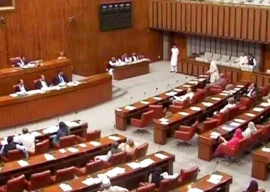The budget has two sides — taxation and expenditure. The difference between the two, the revenue deficit, is signalling debt accumulation beyond the sustainability requirements of the law on fiscal responsibility. Fiscal deficit, defined as revenue deficit plus borrowing for the PSDP, is likely to end up around six per cent of the GDP in the final accounts.
On the side of taxation, the country is light years away from taxing agricultural incomes. Gains from property and capital are likely to be brought in the net. With the 7th NFC having reversed the federal and provincial shares, the star proposal for the federal budget was the VAT. It will find a special mention in the budget speech, but none perhaps in the finance bill. The urgency shown in its introduction was only partly the result of the IMF conditionality.
Much greater pressures were at work to mobilise larger resources for the federal government, post-NFC.
The details that have come out about the agreement with the Sindh government show that the intention now is to protect a semblance of an integrated structure of the VAT, as the province has won its argument for keeping with it the major revenue spinners like telecommunications and financial services. But the finale is not yet in sight. Other provinces still have to sign up. The government of Punjab had hoped that the ‘intransigence’ of Sindh would save it the trouble of taking a clear stand. Earlier, the PML-N Quaid had opposed the very concept of VAT. Just before the budget, the leader of the opposition in the National Assembly, a PML-N stalwart, has announced tooth and nail resistance to the VAT. With almost all of its countless task forces filled with businessmen swearing against VAT, the government of Punjab cannot but be a naysayer, especially when the jamaat, known for its affiliation with small and medium traders, is calling for a long march to protest VAT.
A characteristic feature of Pakistani public finances is the under-pitching of current expenditures and over-pitching of the development expenditure. In the present terror-stricken state of the economy, this feature has become much more pronounced. The only likelihood in the budget is the reduction of tax expenditures by raising prices, energy being the most important.
Budgets are supposed to reflect government philosophy and policy. Political manifestoes can wait. With the return of the economists of a particular persuasion to finance, planning and revenue and the State Bank getting a fellow traveller soon, the stage is being set for the recreation of the miracle — Chile under General Pinochet. Whether Hamlet can be staged without the Prince of Denmark is perhaps another matter.
Published in the Express Tribune, June 4th, 2010.

1720097164-0/BeFunky-collage-(9)1720097164-0-165x106.webp)
1730446133-0/BeFunky-collage-(7)1730446133-0-165x106.webp)


1730543683-0/Express-Tribune--(3)1730543683-0-270x192.webp)

1730543238-0/Untitled-design-(86)1730543238-0-270x192.webp)

1730533347-0/Untitled-design-(85)1730533347-0-270x192.webp)







COMMENTS (1)
Comments are moderated and generally will be posted if they are on-topic and not abusive.
For more information, please see our Comments FAQ